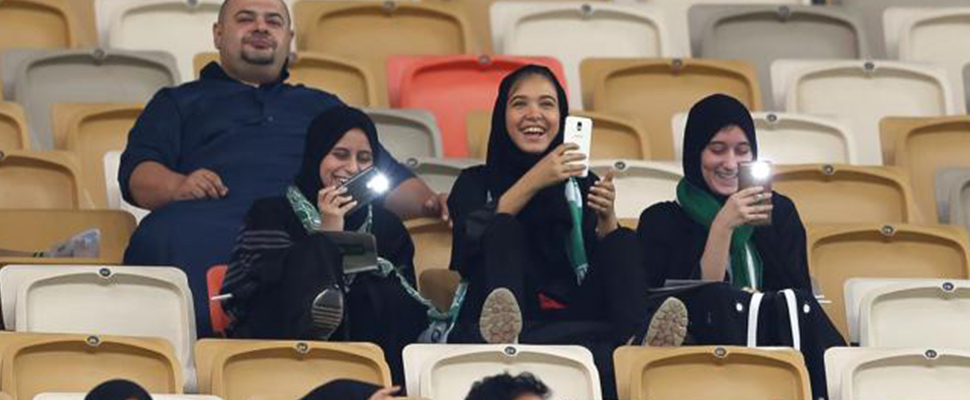Saudi Arabia: What is the importance of social reforms for women?
Since the heir to the throne, Mohamed Bin Salman, began his plan of reforms, several have had repercussions for Saudi women

For the first time in the history of the Kingdom of Saudi Arabia, women attended a public sporting event. On Friday, January 12, about 1200 women were able to enter the King Abdullah Sports City Stadium, in the city of Jeddah, to witness the match between Al-Ahli and Al-Batin. The match ended 5 to 0 in favor of the firsts.
The women who were in the stadium had to sit in a section reserved only for those of their gender or, failing that, with a male relative in the so-called "family tiers". These sections have private bathrooms, separate entrances for men and even exclusive worship sites.
All these measures are due to a reforms plan that Mohamed Bin Salman, the crown prince of the Arab kingdom, has launched since 2015. Saudi Arabia is governed by a very conservative branch of Sunnism, Wahhabism. This doctrine, considered as extremist within Islam, is responsible for many of the severe restrictions that exist in the Arab country.
Now, Prince Bin Salman seeks to open his hermetic kingdom to other countries, and even promised to convert Saudi Arabia IGNORE INTO a kingdom of "moderate Islam open to all religions of the world."
What are the reforms and how do they affect women in Saudi Arabia?
Prince Bin Salman recently allowed women to attend national celebrations such as the National Day of Saudi Arabia, also in specific family zones. In June 2018, women will be able to legally drive cars for the first time.
With shy steps, the Saudi government seeks a more open role for women in their society. This measurments are shy because they do not necessarily mean that it is a priority for women to acquire more rights; however, their repression seems to be diminished.
In 2015, during the ceremony that elevated the prince as the future successor to the throne, he stressed the importance that young people have for the future of the country, but not women.
The statement is not the only symptom of the submissive role that the Saudi women play in their society. Last year, the Women's Council of Al Qasim, whose members were exclusively men, was inaugurated. The following words came from a member of the royal family: "In Al Qasim, we see women as sisters of men and we feel the responsibility to give more opportunities to their work".
It is not an expression that puts women with men in an equal position. They are seen as "sisters", that is, a role limited to the family. It would be the same to say that they are seen as mothers or daughters.
They are never said to be subjects, with their own agency, and much less from the Wahabi interpretation. In Saudi society, women should always be under the protection of a family member, who decides for them issues such as getting a passport, traveling, studying, or opening a bank account.
Yes, it is true that now women in Saudi Arabia can vote and stand for elections, they will be able to drive and attend public events. However, to what extent does it allow these women to be subjects that contribute to the construction of their country?
The royal family wants to promote a project to transform Saudi Arabia's economy by 2030, whose main objective is to stop relying on oil as a source of wealth. If women could start businesses freely and manage their own finances, contrary to what Wahhabism dictates, maybe that could contribute to the country's economic independence. What makes this transformation more urgent is that 95% of the workforce is male.
Even more, the country’s situation would improve if women have free access to education, because in that way the Saudi government would have a new educated workforce. Currently, women can only take specific careers and 80% of those who graduate do not find a job.
It is easy to make these criticisms from a Western society, that is unable to come to terms with ideologies that sometimes contradict some Western principles. It is not as if on this side of the world, there is an equal treatment for women. Especially, when there are still wage gaps and an endemic custom for sexual harassment.
However, it would be irresponsible not to recognize that Saudi Arabia, and in general the Islamic world, revokes any notion of the subject of women and rather establishes it as an extension of men in the public sphere and restricts their private sphere.
For now, these irrelevant measures by Prince Bin Salman do not contribute to the social valorization of women, but rather due to the pressure that the West makes on the kingdom if it wants to open up to the world.
LatinAmerican Post | Iván Parada Hernández
Copy edited by Susana Cicchetto
* Writer’s opinion does not represent this newspaper
Listen this article





